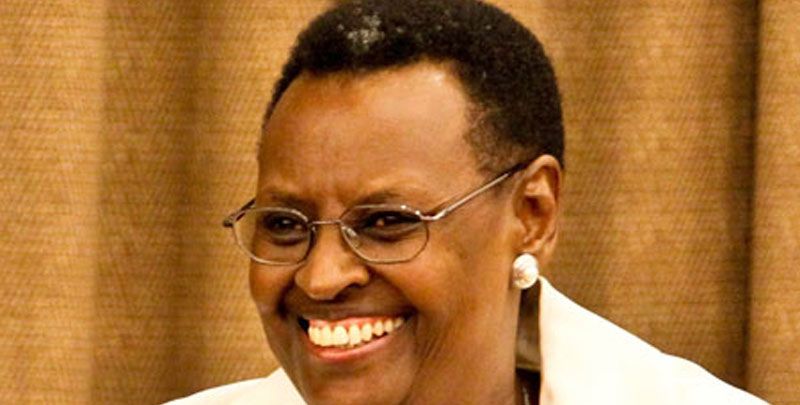
Uganda’s First Lady accused of trying to obstruct Biotechnology Bill
The First Lady and Minister of Education Janet Museveni has for the first time stepped into the spotlight as an opponent of the long-debated Biotechnology and Biosafety Bill 2012.
On Monday July 17, Mrs. Museveni organised and chaired a meeting at State House in Nakasero that was dominated by staunch opponents of the proposed law. The development presents a dramatic clash in the highest office and first family as it promises to pit the First Lady against her husband President Yoweri Museveni who is a strong supporter of the bill.
The bill, though is sponsored by the government, has been in Parliament for the last six years and has suffered several setbacks.
The Chairman of the Science and Technology Committee Eng. Kafeero Ssekitooleko told an International Conference of Science Communicators held in Entebbe on Tuesday that the First Lady invited him and the Minister of Science Dr. Elioda Tumwesigye to what they thought would be a knowledge session about the bill.
He said that although the matter is now in the hands of the Speaker, he accepted to have a meeting with Mrs. Museveni in her capacity as Minister of Education but also as an important stakeholder who had never attended a sensitization meeting organised by the committee or the mainstream science organisations.
Accompanied by a team of three scientists, Ssekitooleko says that they were shocked to find a hostile team of over 40 anti-science campaigners that included MPs who are opposed to the bill, in State House.
Kafeero said: “We thought that we were going to meet the First Lady in her capacity as the minister of education. Little did we know that other members who are against the bill had been mobilised for that meeting without our knowledge.”
One scientist who attended the meeting but prefers to remain anonymous, says the meeting turned into a platform of bashing the technology and demonising Ugandan scientists who have spent close to two decades searching for solutions to some of the most pervasive problems affecting Ugandan farmers and stood in the way of the country’s rapid economic progress.
Kafeero diplomatically told the science communicator’s meeting that he put up a spirited fight and tried to convince the First Lady about the benefits of having a law. But other members who attended the State House meeting reveal that it was meant to silence scientists and to stop the bill from being debated as scheduled next week in Parliament.
“We fell into an ambush,” said the pro-Biotech scientist; “The meeting was very hostile and most people spoke from ideological points of view with a lot of sentiments and anger.”
“Most of the MPs, including ironically from Teso and other regions that are facing hunger because of drought, described themselves as preachers and people of God who can not tolerate anyone who tries to play God,” recalls the scientist who attended the meeting.
“They accused us scientists of playing God and vowed not to pass the bill,” added the scientist, who pointed that the group insisted that the bill be withdrawn or an alternative bill introduced with the effect of banning all products of modern biotechnology.
But MP Ssekitooleko insisted that he will not withdraw the bill but expressed willingness to make concessions arising from some of the recommendations of the S&T Committee report on the bill for compromise.
“We all agreed in principle that the Hon. Elioda prepares an information paper for cabinet, at least to cater for the fact that some people in cabinet were not new during the last parliament. But as he prepares that information paper, he should take scientists both for and against to cabinet to explain. There after, we shall come to caucus. But we agreed that both meetings must be chaired by H.E the President,” notes Ssekitooleko.
But some of the scientists, who spoke to The Sunrise, appeared disappointed by the rancour that characterised the speeches by the anti-GMO group.
The meeting also comes after the release of a report by the S&T Committee which contains radical views such as life imprisonment punishments for scientists who commit mistakes.
Supporters of the proposed law say it will empower Ugandan scientists to develop solutions to address the increasing challenges of climate change suffered by majority of Ugandans who are farmers and consumers, such as rising incidences of pests and diseases coupled with droughts.
Also, due to the technology’s promise to boost food production, supporters say it will alleviate poverty, contribute to price and hence economic stability and boost regional trade, let alone make Uganda less reliant on external assistance.
A number of scientists and legislators who support the bill have criticised the first lady for evading sensitization workshops and meetings organised by mainstream scientific agencies to educate her on the benefits of the technology.
Beatrice Anywar, the Woman MP for Kitgum district, however allayed fears by some of the scientists when she said that majority of MPs still have support the bill.
Dr. Charles Mugoya, the chairman of the National Biosafety Committee, the designated authority that checks and approves the safety of Biotechnology products, noted that opponents to Uganda’s biotechnology and biosafety bill are just not well informed.
Efforts by this reporter to reach the First Lady for a comment on the matter were futile.















Henry Lutaaya
Leave a Comment
Your email address will not be published.